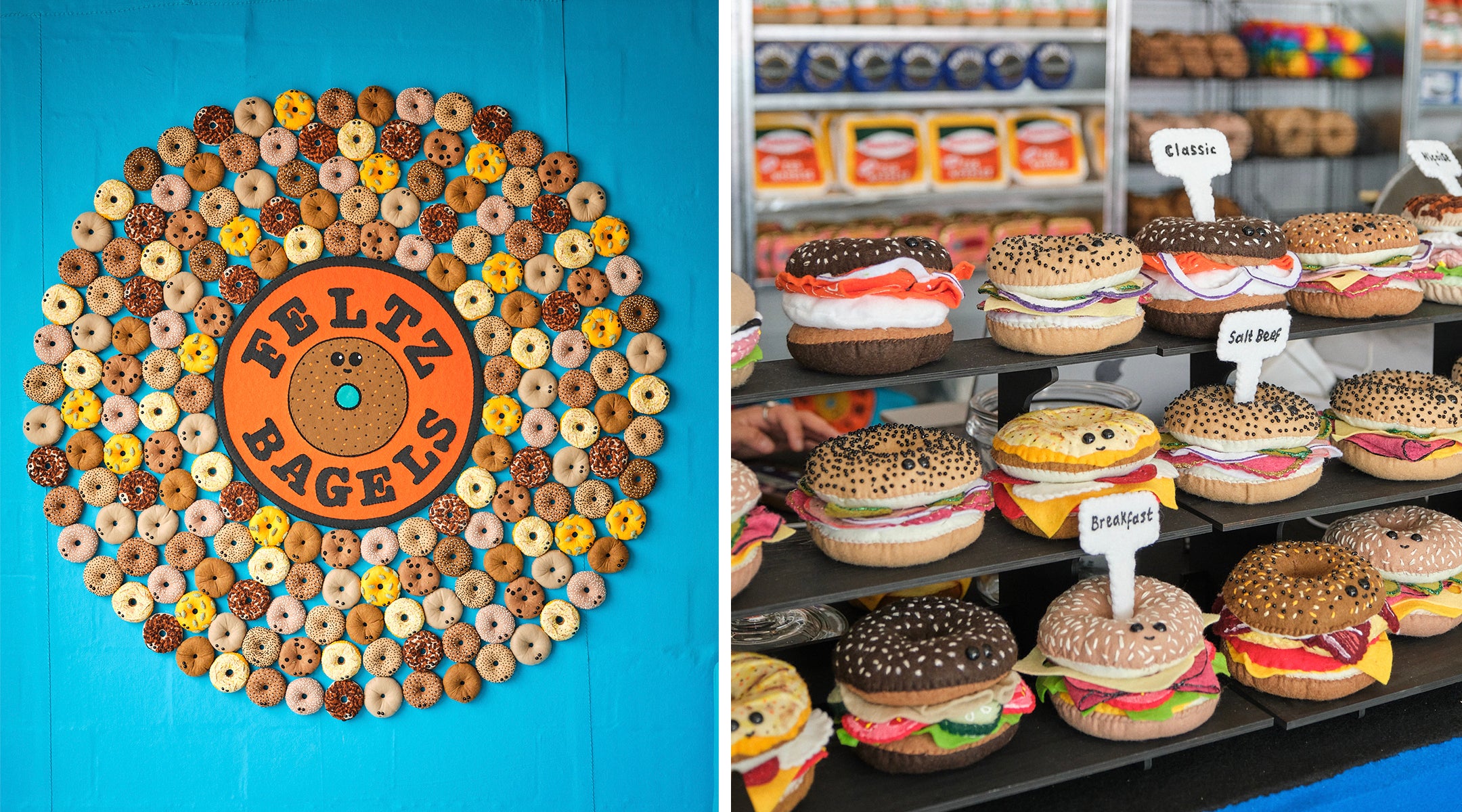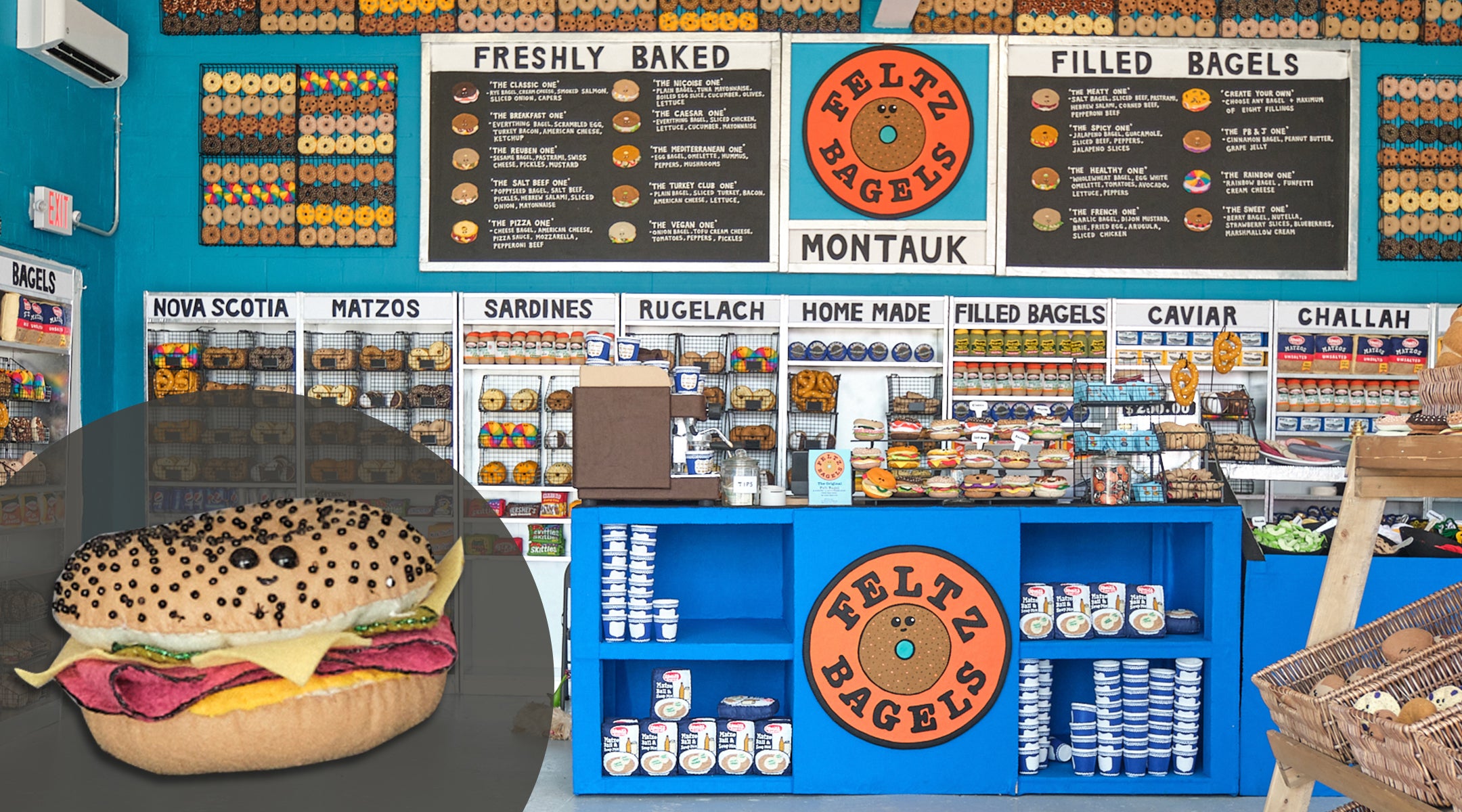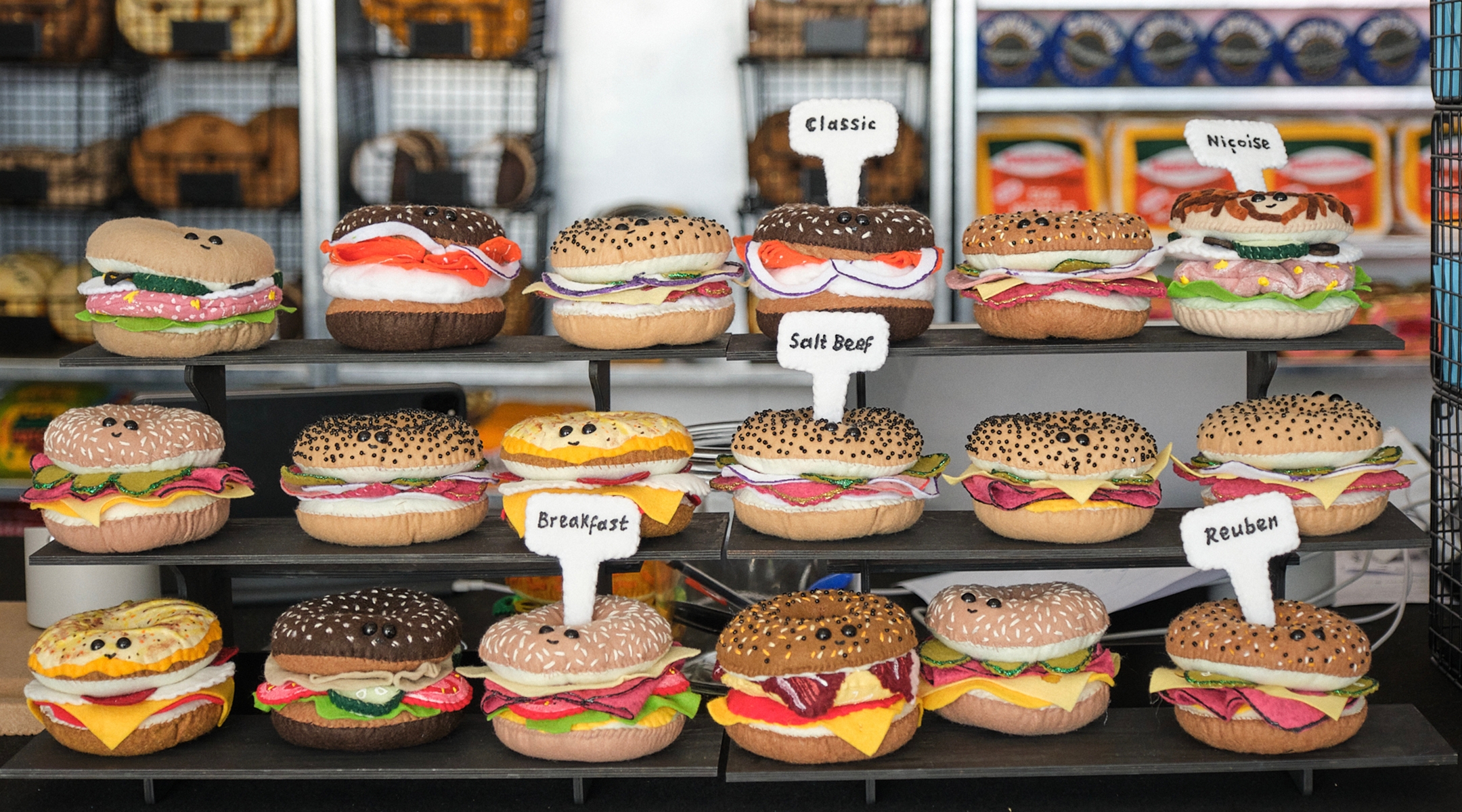(New York Jewish Week) — Anyone walking into Feltz Bagels in Montauk, New York, could be forgiven for wanting to taste everything on the menu: There are 15 types of bagels; a variety of schmears, meats and toppings, as well as desserts like rugelach and babka by the slice.
But while everything in the shop is for sale, it won’t taste very good: Everything at Feltz Bagels, from the ticket machine to the challahs to the “We Are Happy to Serve You” cups of coffee, is made entirely out of felt.
Feltz Bagels, a complete recreation of a New York bagel bakery, is the invention of Lucy Sparrow, a 37-year-old, U.K.-based artist who specializes in felt. Since 2014, Sparrow has mounted a variety of installations around the globe that recreate everyday, interactive commercial spaces — markets, pharmacies, corner stores — out of the soft, fuzzy material.
Feltz Bagels — which is currently on view through Sept. 4 at TW Gallery in Montauk — came about as an outgrowth of her first show in the United States in 2017: “8 ‘Till Late,” a recreation of a classic New York bodega that drew crowds to the Standard, High Line hotel. In selecting items for her felt bodega,
“I chose designs that looked the best, to me: a simple label, classic design, not too much writing,” Sparrow told the New York Jewish Week, describing how she came to home in on Jewish foods.
It just so happened that many of these simple designs were used in the packaging for Ashkenazi Jewish staples: Streit’s matzah, gefilte fish, Manischewitz egg noodles.
“When I did that first show, I had loads of feedback from people, like, ‘Thanks so much for making these Jewish foods,’” said Sparrow, who is not Jewish and, at the time, had only been to New York once before. “The response was just amazing.”

Everything is made of felt at Feltz Bagels, created by Lucy Sparrow. (Michael DeTemple)
Recreating a bagel bakery, Sparrow said, seemed to be a no-brainer for her next New York show. “My favorite area of New York has always been the Lower East Side,” said Sparrow, who has since been to New York about 20 times. “The fact that bagels and the Lower East Side are really synonymous with each other; the idea gave birth to itself, in a way.”
“Everybody has this personal story, this personal preference of what [bagels] they eat, what it means to them, what memories it sums up,” she said. “That, depicted in art, seemed like a very strong idea.”
Sparrow drew upon classic New York delis and appetizing spots, including Russ & Daughters, Katz’s Delicatessen and Zabar’s — “these New York institutions that seem to be really imprinted upon New Yorkers,” she said. And while Feltz Bagels may be more colorful than a typical bagel store, Sparrow nailed the iconic “deli look.”
Bagels, Sparrow points out, are both highly universal and extremely personal. “Workers on a construction site go and get a bagel. Office workers also go and get a bagel — there seems to be no [single] demographic,” she said. “It’s a leveler. It’s universal, but it’s also very personal. There are not a lot of foods that have that. People have a lot of opinions about bagels.”

At Feltz Bagels, artist Lucy Sparrow recreates a New York bagel bakery inside the TW Gallery in Montauk. (Photos by Michael DeTemple; design by Mollie Suss)
Sparrow, too, has her particulars: A vegetarian, her typical lunchtime bagel order is sun-dried tomato cream cheese, American cheese, mushrooms, peppers and lettuce on a salt bagel. “I absolutely love bagels — the last one I had was yesterday,” she said.
Everything is for sale at Feltz Bagels, whose punny name also pays tribute to British Jewish TV presenter Vanessa Feltz. An anthropomorphized rugelach is $10, while a whole bagel starts at $60 and a bagel with fixings is $250. (And like any proper, present-day Jewish eatery worth its, well, salt, there is Feltz Bagels merch, including stickers and sweatshirts.)
Nearly all the felt food items are adorned with eyes, adding another layer of whimsy to the experience.
“I think it’s lovely watching grown adults come in and they’re like, ‘Ohhh, it’s got a face!’” Sparrow said. “And then they make them, and they take them home. And these pieces of art that I’ve put so much love into live in people’s homes, and just go on living the rest of their lives in houses that I’ll never see the inside of.”
So far, the most popular order has been a classic combo: cream cheese, lox, onion, tomatoes and capers, Sparrow said. The type of bagel, however, tends to vary. A more unusual option is the salt beef, the British term for corned beef — rarely available at the standard bagel shop.
For those not able to make it out to Montauk before next weekend, don’t despair: Feltz Bagels will open in Manhattan in October, with a stop in Miami to follow. Sparrow has a team of three assistants in the United Kingdom working to get the New York show ready; at the moment, she said, they are creating more felt black-and-white cookies, another deli staple. Sparrow hopes to expand her offerings in New York, adding cinnamon babka (in addition to chocolate), dried fruit and maybe even a seder plate.
Sparrow, who lives in the “tiniest village” in England’s Suffolk County, added that the best part of her hard work is having customers “open their hearts” to her. Just the other day, she said, someone came in and shared a story about their grandmother’s bagel recipe.
“It’s the stories I love hearing,” she said. “I’m just overwhelmed that people want to share them with me.”
The New York Jewish Week brings you the stories behind the headlines, keeping you connected to Jewish life in New York. Help sustain the reporting you trust by donating today.





